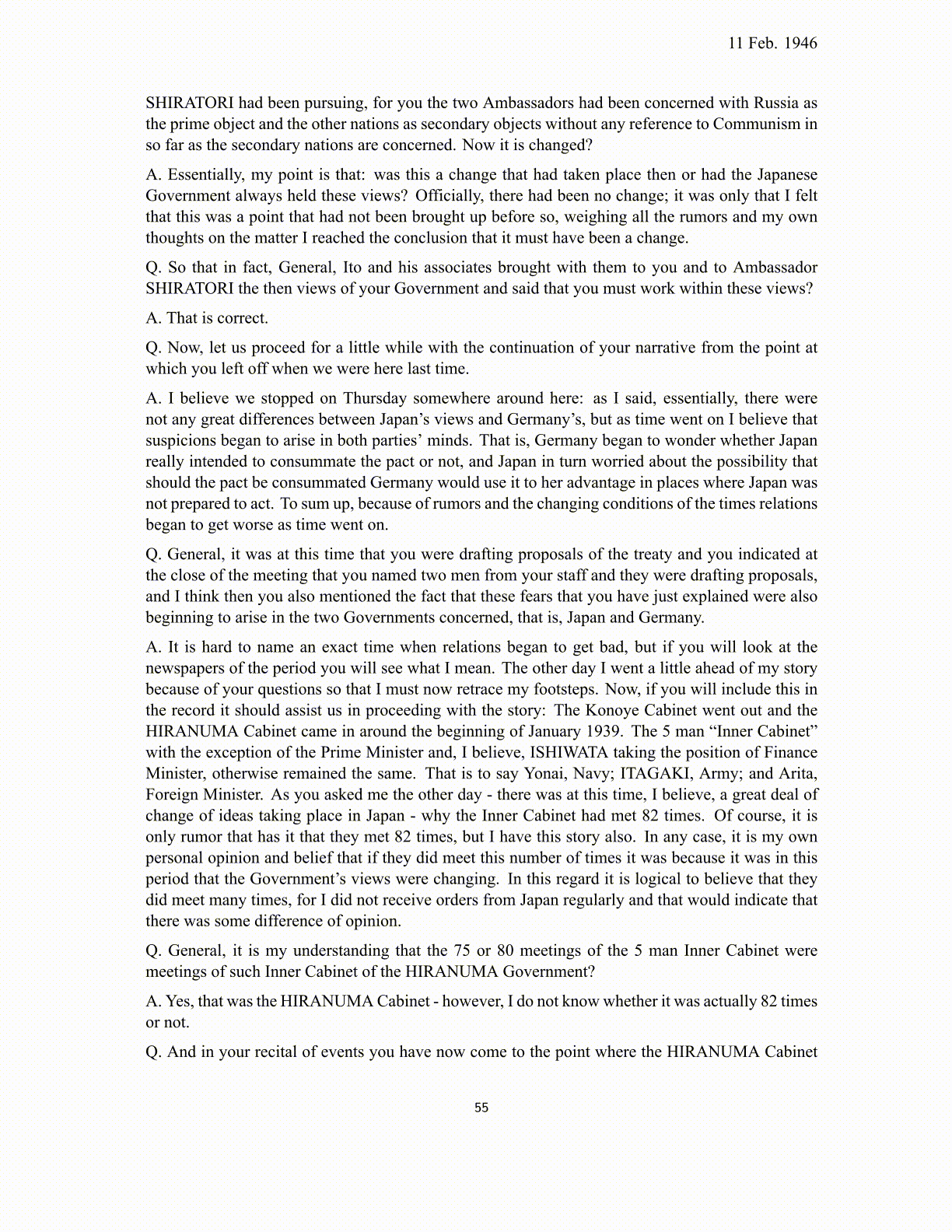
11 Feb. 1946 SHIRATORI had been pursuing, for you the two Ambassadors had been concerned with Russia as the prime object and the other nations as secondary objects without any reference to Communism in so far as the secondary nations are concerned. Now it is changed? A. Essentially, my point is that: was this a change that had taken place then or had the Japanese Government always held these views? Officially, there had been no change; it was only that I felt that this was a point that had not been brought up before so, weighing all the rumors and my own thoughts on the matter I reached the conclusion that it must have been a change. Q. So that in fact, General, Ito and his associates brought with them to you and to Ambassador SHIRATORI the then views of your Government and said that you must work within these views? A. That is correct. Q. Now, let us proceed for a little while with the continuation of your narrative from the point at which you left off when we were here last time. A. I believe we stopped on Thursday somewhere around here: as I said, essentially, there were not any great differences between Japan’s views and Germany’s, but as time went on I believe that suspicions began to arise in both parties’ minds. That is, Germany began to wonder whether Japan really intended to consummate the pact or not, and Japan in turn worried about the possibility that should the pact be consummated Germany would use it to her advantage in places where Japan was not prepared to act. To sum up, because of rumors and the changing conditions of the times relations began to get worse as time went on. Q. General, it was at this time that you were drafting proposals of the treaty and you indicated at the close of the meeting that you named two men from your staff and they were drafting proposals, and I think then you also mentioned the fact that these fears that you have just explained were also beginning to arise in the two Governments concerned, that is, Japan and Germany. A. It is hard to name an exact time when relations began to get bad, but if you will look at the newspapers of the period you will see what I mean. The other day I went a little ahead of my story because of your questions so that I must now retrace my footsteps. Now, if you will include this in the record it should assist us in proceeding with the story: The Konoye Cabinet went out and the HIRANUMA Cabinet came in around the beginning of January 1939. The 5 man “Inner Cabinet” with the exception of the Prime Minister and, I believe, ISHIWATA taking the position of Finance Minister, otherwise remained the same. That is to say Yonai, Navy; ITAGAKI, Army; and Arita, Foreign Minister. As you asked me the other day - there was at this time, I believe, a great deal of change of ideas taking place in Japan - why the Inner Cabinet had met 82 times. Of course, it is only rumor that has it that they met 82 times, but I have this story also. In any case, it is my own personal opinion and belief that if they did meet this number of times it was because it was in this period that the Government’s views were changing. In this regard it is logical to believe that they did meet many times, for I did not receive orders from Japan regularly and that would indicate that there was some difference of opinion. Q. General, it is my understanding that the 75 or 80 meetings of the 5 man Inner Cabinet were meetings of such Inner Cabinet of the HIRANUMA Government? A. Yes, that was the HIRANUMA Cabinet - however, I do not know whether it was actually 82 times or not. Q. And in your recital of events you have now come to the point where the HIRANUMA Cabinet 55